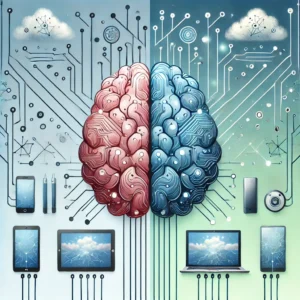Mental Health and Technology: The Future of Wellness in 2024
The Intersection of Mental Health and Technology: Shaping the Future of Wellness in 2024
In 2024, mental health technology is transforming how we manage emotional well-being, providing innovative tools that are more accessible and personalized than ever before. From AI therapy apps to mental health wearables, technology is reshaping the way we approach self-care, therapy, and emotional health.
The Growing Demand for Accessible Mental Health Care
As mental health challenges like anxiety, depression, and stress become more prevalent, the need for accessible mental health care is rising. Traditional therapy can be costly, time-consuming, and difficult to access, particularly for people in remote areas. This is where mental health technology steps in, offering solutions that break down barriers and provide support to anyone in need, right from their smartphones or wearable devices.
In 2024, advancements in tech have made mental health support more personalized, helping individuals access care tailored to their needs, without the challenges of in-person visits.
AI Therapy Apps: A Game-Changer in Mental Health Care
Artificial intelligence (AI) has revolutionized numerous industries, and now it’s making a significant impact on mental health. AI therapy apps like Woebot and Wysa use conversational AI to offer real-time emotional support, mindfulness exercises, and cognitive behavioral therapy (CBT). These apps are available 24/7, allowing users to access help whenever they need it, without waiting for an appointment.
While these apps can’t replace human therapists, they are a valuable tool for managing stress, anxiety, and even depression. By analyzing patterns in users’ conversations, these apps can deliver personalized suggestions, helping individuals build coping mechanisms and reduce emotional distress. With millions of people embracing these AI therapy apps in 2024, they have become a vital part of the mental health care ecosystem.
Wearables: Tracking Emotional Well-being in Real Time
Wearable technology has also made significant strides in mental health. Devices like smartwatches now go beyond tracking physical health, offering features that monitor stress levels, heart rate variability, and sleep patterns—factors that directly influence mental wellness.
For example, devices like the Apple Watch or Fitbit can alert users when they are experiencing elevated stress levels based on heart rate or breathing patterns. By providing biofeedback, these wearables help users become more aware of their emotional states, empowering them to take proactive steps to manage stress and anxiety before it escalates.
The real-time data collected by these devices can also be shared with healthcare providers, giving professionals deeper insights into a patient’s mental health and lifestyle factors that may impact their well-being.
The Rise of Teletherapy and Online Counseling
In recent years, teletherapy has gained immense popularity, and 2024 is no exception. Platforms like BetterHelp and Talkspace are making therapy more accessible by allowing individuals to connect with licensed professionals from the comfort of their own homes. Sessions can be conducted through video calls, text messages, or phone conversations, offering flexibility and convenience for people with busy schedules or limited access to in-person therapy.
These platforms are also integrating AI-based matching systems, which pair users with therapists based on their specific needs and preferences. This improves the chances of finding a therapist that’s the right fit, increasing the effectiveness of treatment. As teletherapy continues to grow, it is breaking down geographical and financial barriers, making mental health care more inclusive.
Mental Health Apps for Everyday Self-Care
While therapy and counseling are essential for many, self-care apps are also playing a crucial role in mental health management. Apps like Headspace and Calm offer guided meditation, relaxation exercises, and mindfulness practices designed to reduce stress and improve emotional balance.
These apps are perfect for integrating small moments of peace into a busy day, helping individuals take control of their mental health without needing to schedule a formal therapy session. Journaling apps like Reflectly allow users to track their emotions, document their thoughts, and engage in self-reflection, often with the support of AI that provides insights into their mental state.
By empowering users to develop healthier habits, these mental health apps are democratizing wellness, making self-care accessible to anyone with a smartphone.
Ethical Considerations of Mental Health Technology
Despite the benefits, the rise of mental health technology also raises important ethical concerns, particularly regarding data privacy. Mental health apps and wearables collect highly sensitive information about users’ emotions, habits, and mental states, making the protection of this data crucial.
In 2024, companies developing mental health tools must prioritize transparency and security. Ensuring compliance with data protection laws like GDPR and offering clear privacy policies is essential to maintaining user trust. As this technology grows, ethical considerations will continue to play a central role in its development.
Virtual Reality Therapy: Immersive Treatment for Anxiety and PTSD
Another groundbreaking technology in mental health care is virtual reality (VR) therapy. VR has proven to be highly effective in treating anxiety disorders, PTSD, and phobias by allowing individuals to confront their fears in a controlled, virtual environment.
In 2024, VR therapy is becoming more widely accessible, offering immersive experiences that simulate real-life scenarios. For example, individuals with social anxiety can practice interactions in a virtual setting, while those with PTSD may gradually confront traumatic memories in a safe space. These therapies can be more engaging and effective than traditional exposure therapy, making them an exciting addition to mental health treatment options.
The Future of Mental Health Technology
The future of mental health technology is incredibly promising. AI is expected to become even more sophisticated, offering deeper insights and more personalized support. We can anticipate more advanced mental health wearables with better sensors to track subtle emotional changes, providing users with proactive strategies to manage their mental wellness in real time.
Additionally, VR therapy will likely continue to expand, making immersive mental health treatment more accessible to individuals seeking alternative therapies. As this technology evolves, it will play an even more prominent role in how we manage and prioritize our mental health.
Conclusion
In 2024, mental health technology is reshapinhttps://www.barnesandnoble.com/w/the-intersection-of-mental-health-and-technology-oheta-sophia/1146211421g the future of wellness, offering new tools that make emotional support more accessible and personalized than ever before. From AI therapy apps to mental health wearables, these innovations are giving people the ability to take control of their well-being in ways we couldn’t have imagined just a few years ago.
As we look to the future, the intersection of technology and mental health will continue to offer exciting opportunities for improving emotional wellness, providing hope and support for individuals worldwide. The future of mental health care is bright, and with the continued development of these technologies, we are better equipped to address mental health challenges head-on.
By embracing the possibilities of mental health technology, we are making strides toward a world where mental wellness is prioritized, accessible, and supported by the latest advancements in tech.





